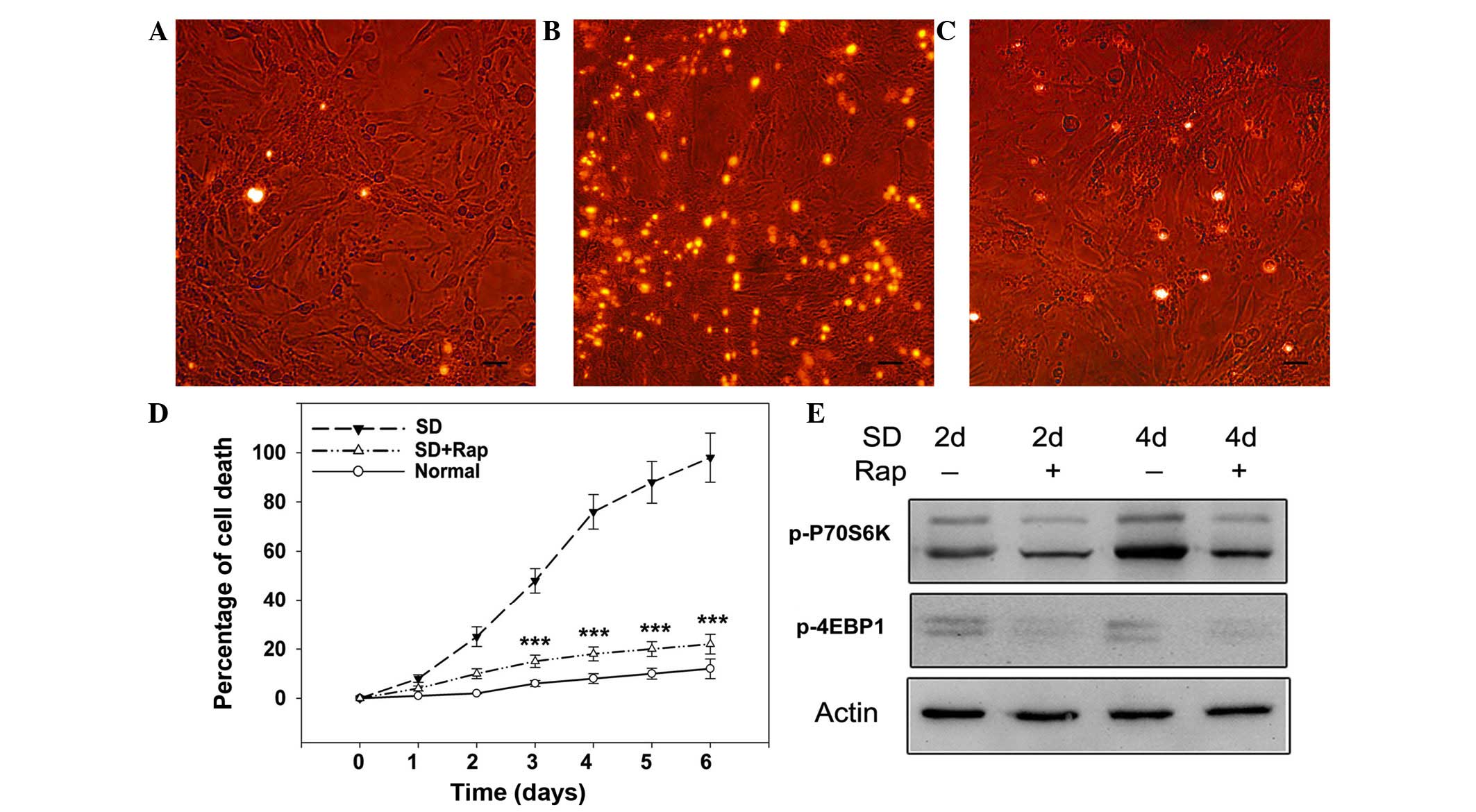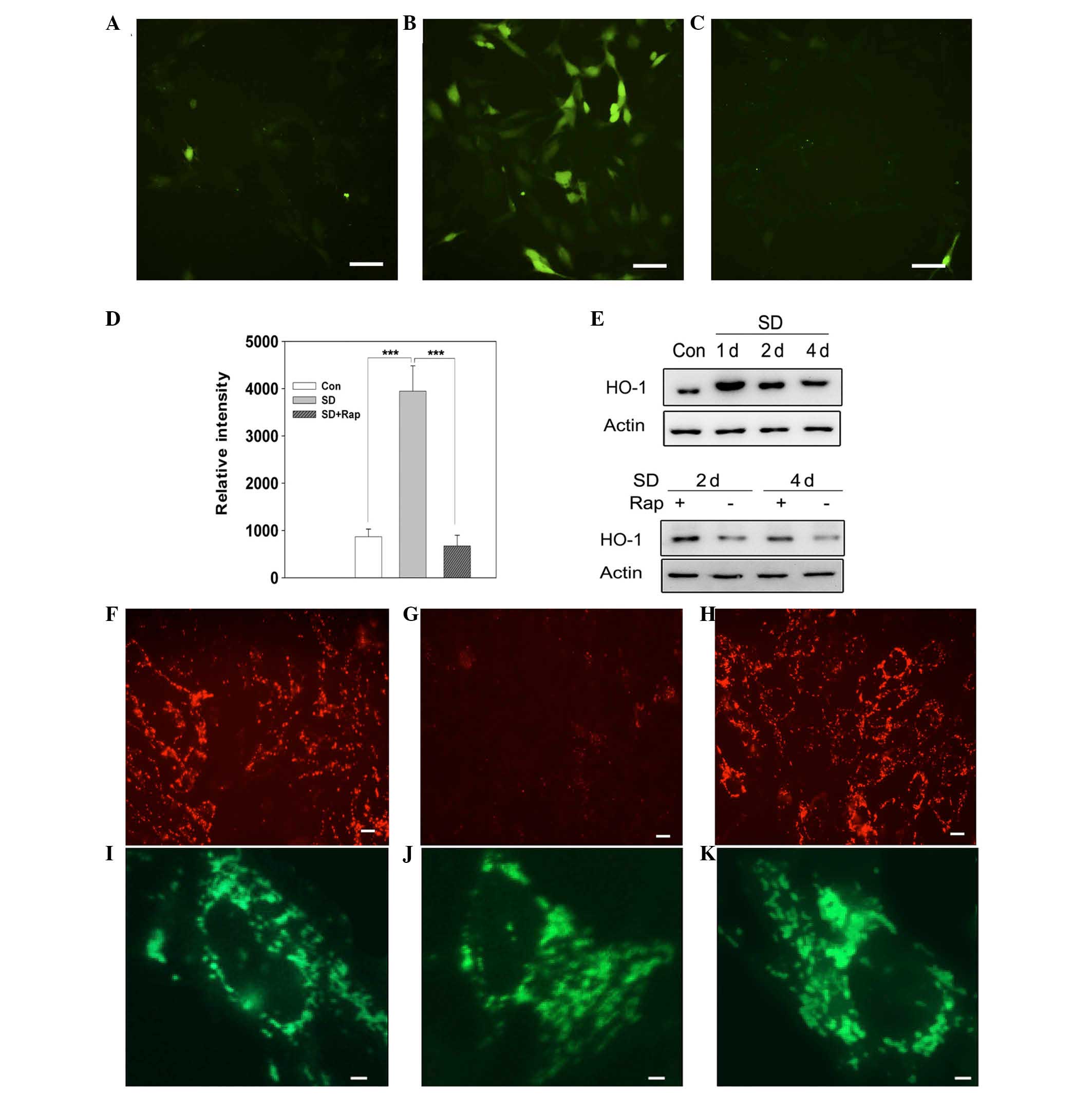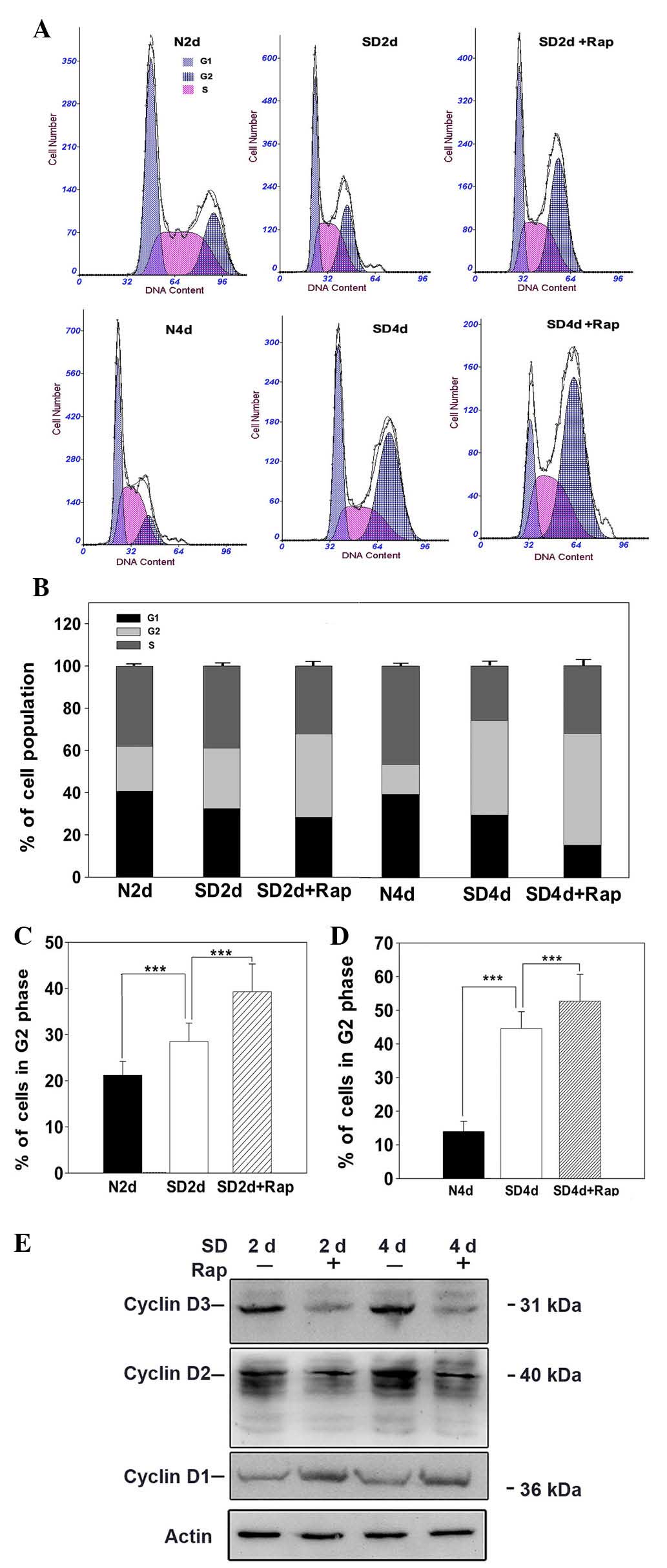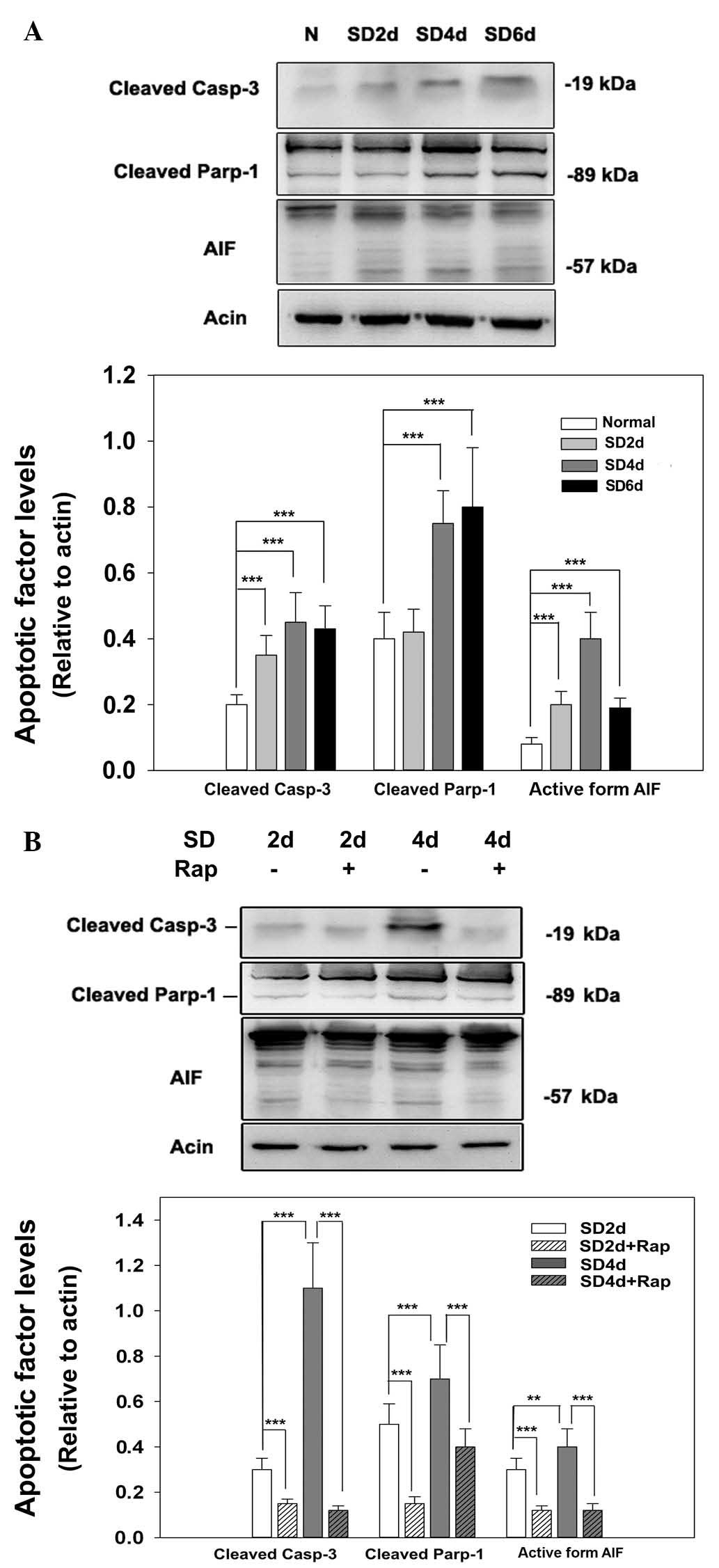|
1
|
Wullschleger S, Loewith R and Hall MN: TOR
signaling in growth and metabolism. Cell. 124:471–484. 2006.
View Article : Google Scholar : PubMed/NCBI
|
|
2
|
Loewith R, Jacinto E, Wullschleger S,
Lorberg A, Crespo JL, Bonenfant D, Oppliger W, Jenoe P and Hall MN:
Two TOR complexes, only one of which is rapamycin sensitive, have
distinct roles in cell growth control. Mol Cell. 10:457–468. 2002.
View Article : Google Scholar : PubMed/NCBI
|
|
3
|
Manning BD and Cantley LC: Rheb fills a
GAP between TSC and TOR. Trends Biochem Sci. 28:573–576. 2003.
View Article : Google Scholar : PubMed/NCBI
|
|
4
|
Hay N and Sonenberg N: Upstream and
downstream of mTOR. Genes Dev. 18:1926–1945. 2004. View Article : Google Scholar : PubMed/NCBI
|
|
5
|
Harada T, Harada C and Parada LF:
Molecular regulation of visual system development: More than meets
the eye. Genes Dev. 21:367–378. 2007. View Article : Google Scholar : PubMed/NCBI
|
|
6
|
von Bartheld CS: Neurotrophins in the
developing and regenerating visual system. Histol Histopathol.
13:437–459. 1998.PubMed/NCBI
|
|
7
|
Wen R, Tao W, Li Y and Sieving PA: CNTF
and retina. Prog Retin Eye Res. 31:136–151. 2012. View Article : Google Scholar :
|
|
8
|
Tan E, Ding XQ, Saadi A, Agarwal N, Naash
MI and Al-Ubaidi MR: Expression of cone-photoreceptor-specific
antigens in a cell line derived from retinal tumors in transgenic
mice. Invest Ophthalmol Vis Sci. 45:764–768. 2004. View Article : Google Scholar : PubMed/NCBI
|
|
9
|
Brem R, Li F, Montaner B, Reelfs O and
Karran P: DNA breakage and cell cycle checkpoint abrogation induced
by a therapeutic thiopurine and UVA radiation. Oncogene.
29:3953–3963. 2010. View Article : Google Scholar : PubMed/NCBI
|
|
10
|
Riethdorf S, Müller V, Zhang L, Rau T,
Loibl S, Komor M, Roller M, Huober J, Fehm T, Schrader I, et al:
Detection and HER2 expression of circulating tumor cells:
Prospective monitoring in breast cancer patients treated in the
neoadjuvant GeparQuattro trial. Clin Cancer Res. 16:2634–2645.
2010. View Article : Google Scholar : PubMed/NCBI
|
|
11
|
Ma GF, Chen SY, Sun ZR, Miao Q, Liu YM,
Zeng XQ, Luo TC, Ma LL, Lian JJ and Song DL: FoxP3 inhibits
proliferation and induces apoptosis of gastric cancer cells by
activating the apoptotic signaling pathway. Biochem Biophys Res
Commun. 430:804–809. 2013. View Article : Google Scholar
|
|
12
|
Qi Y, Li Y, Zhang Y, Zhang L, Wang Z,
Zhang X, Gui L and Huang J: IFI6 inhibits apoptosis via
mitochondrial-dependent pathway in Dengue virus 2 infected vascular
endothelial cells. PLoS One. 10:e01327432015. View Article : Google Scholar : PubMed/NCBI
|
|
13
|
Stojkovic M, Machado SA, Stojkovic P,
Zakhartchenko V, Hutzler P, Gonçalves PB and Wolf E: Mitochondrial
distribution and adenosine triphosphate content of bovine oocytes
before and after in vitro maturation: Correlation with
morphological criteria and developmental capacity after in vitro
fertilization and culture. Biol Reprod. 64:904–909. 2001.
View Article : Google Scholar : PubMed/NCBI
|
|
14
|
Li GY, Fan B and Jiao YY: Rapamycin
attenuates visible light-induced injury in retinal photoreceptor
cells via inhibiting endoplasmic reticulum stress. Brain Res.
1563:1–12. 2014. View Article : Google Scholar : PubMed/NCBI
|
|
15
|
Belli M, Sapora O and Tabocchini MA:
Molecular targets in cellular response to ionizing radiation and
implications in space radiation protection. J Radiat Res.
43(Suppl): S13–S19. 2002. View Article : Google Scholar
|
|
16
|
Morita M, Gravel SP, Hulea L, Larsson O,
Pollak M, St-Pierre J and Topisirovic I: mTOR coordinates protein
synthesis, mitochondrial activity and proliferation. Cell Cycle.
14:473–480. 2015. View Article : Google Scholar : PubMed/NCBI
|
|
17
|
Du H, Duanmu M, Witte D and Grabowski GA:
Targeted disruption of the mouse lysosomal acid lipase gene:
Long-term survival with massive cholesteryl ester and triglyceride
storage. Hum Mol Genet. 7:1347–1354. 1998. View Article : Google Scholar : PubMed/NCBI
|
|
18
|
Hamanaka RB and Chandel NS: Mitochondrial
reactive oxygen species regulate cellular signaling and dictate
biological outcomes. Trends Biochem Sci. 35:505–513. 2010.
View Article : Google Scholar : PubMed/NCBI
|
|
19
|
Yan C, Ding X, Dasgupta N, Wu L and Du H:
Gene profile of myeloid-derived suppressive cells from the bone
marrow of lysosomal acid lipase knock-out mice. PLoS One.
7:e307012012. View Article : Google Scholar : PubMed/NCBI
|
|
20
|
Zhang H, Stallock JP, Ng JC, Reinhard C
and Neufeld TP: Regulation of cellular growth by the Drosophila
target of rapamycin dTOR. Genes Dev. 14:2712–2724. 2000. View Article : Google Scholar : PubMed/NCBI
|
|
21
|
Dowling RJ, Topisirovic I, Alain T,
Bidinosti M, Fonseca BD, Petroulakis E, Wang X, Larsson O, Selvaraj
A, Liu Y, et al: mTORC1-mediated cell proliferation, but not cell
growth, controlled by the 4E-BPs. Science. 328:1172–1176. 2010.
View Article : Google Scholar : PubMed/NCBI
|
|
22
|
Sherr CJ: G1 phase progression: Cycling on
cue. Cell. 79:551–555. 1994. View Article : Google Scholar : PubMed/NCBI
|
|
23
|
Weidner C, Rousseau M, Plauth A, Wowro SJ,
Fischer C, Abdel-Aziz H and Sauer S: Melissa officinalis extract
induces apoptosis and inhibits proliferation in colon cancer cells
through formation of reactive oxygen species. Phytomedicine.
22:262–270. 2015. View Article : Google Scholar : PubMed/NCBI
|
|
24
|
Siddiqui A, Hanson I and Andersen JK:
Mao-B elevation decreases parkin's ability to efficiently clear
damaged mitochondria: Protective effects of rapamycin. Free Radic
Res. 46:1011–1018. 2012. View Article : Google Scholar : PubMed/NCBI
|
|
25
|
Polster BM: AIF, reactive oxygen species,
and neurodegeneration: A 'complex' problem. Neurochem Int.
62:695–702. 2013. View Article : Google Scholar :
|


















